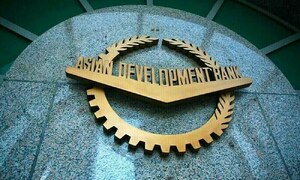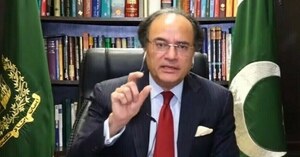Finally, a power sharing deal has been struck after lengthy negotiations: MQM is becoming a part of the PPP-led coalition in Sindh following culmination of successful talks at Sindh Governor's house on Monday night. The Altaf-led party is going to get 13 ministries besides the portfolios of one Adviser and one Special Assistant.
This is indeed a highly significant development on the political horizon of the country owing to a variety of factors: First and foremost is the fact that the accord has coincided with Asif Zardari-Nawaz Sharif meeting in Dubai, where the two leaders are discussing a thorny issue which has led to a critical situation where the coalition government faces the threat of collapse.
It wasn't difficult for anyone to understand the full import of Asif Zardari's speech that he delivered at Nine Zero on April 2. His message was clear, coherent and loud: let's bury the past and make a new beginning for the progress and prosperity of the province and its people. "We [the PPP and the MQM] have forgiven each other to save our country and the next generations who include my three children, Bilawal, Bakhtawar, Asefa and Altaf Husain's Afza. We would not take revenge from humans, rather we do it by changing the system," a visibly emotional Zardari told a milling crowd of MQM workers raising slogans of "Jeay Bhutto", "Jeay Benazir" and "Jeay Zardari".
The PPP co-chairman also addressed those who, according to him, had been pitting the workers and leaders of the two parties against each other over the last many years by saying: "We also forgive them for they may not employ their old tactics again as they may be gripped by a fear after witnessing our today's show of unity". Zardari through his words was adding a chapter of love and peace to the history of a hitherto violence-ridden province of Sindh. Unfortunately, however, bonhomie or the feeling of cheerful friendship that came as a pleasant surprise to the vast majority of people of Sindh did not last long owing to several factors.
Karachiites, in particular, started to fret as soon as they heard about developments that were creating distances between the two parties. Most unfortunately, whatever happened a week later in Karachi in the shape of dastardly acts of violence in reaction to the manhandling of former parliamentary affairs minister Dr Sher Afgan in Lahore gave a nasty turn to the on-going process of talks between the two parties.
Most of the events that followed until recently gave strong indications of possible deterioration in Karachi's law and order situation if MQM did not become part of the coalition set-up. Eventually, the two parties have reached a power-sharing accord. Now the MQM is going to be a partner in Sindh government in a day or two.
According to MQM's Dr Farooq Sattar, the spirit behind the sharing of power with PPP was the vision of the late Benazir Bhutto who carved out the guiding principles for her party. He also said at a press conference that the MQM chief, Altaf Hussain, had been desirous of sharing power with the PPP "throughout the last five years and after the 2002 and 2008 general elections".
Earlier, Pir Mazharul Haq, addressing the press conference, announced that MQM-PPP talks proved fruitful because both the parties wanted to carry forward the process of national reconciliation "which was the desire and thinking of Shaheed Mohtarma Benazir Bhutto". Finally, both the parties have made it.
There seemed to be a slight hiccup in reaching an accord on power-sharing. Prior to the accord, both sides perhaps had a feeling of impotence in the face of an apparently insoluble problem. The leaders of both the parties to the talks were said to have been showing sudden changes in attitude and behaviour. The final analysis of the situation shows that both the parties have played their cards well in dealing successfully with the situation.
In addition to Zulfikar Mirza, the Sindh Home Minister, Dr Asim, Chancellor of Ziauddin Medical University, another old pal of Zardari since his Petaro Cadet College days, is said to have played a key role in making these talks successful. Even for MQM, Dr Asim has been its best winning card vis-a-vis the PPP. Altaf Hussain, through his strong reaction soon after the killing of Benazir Bhutto, was one of those persons who made Zardari feel better when the latter was extremely sad and disturbed. For Zardari, the MQM issue was always on the front burner as it was being given a lot of attention and it was also considered important by his slain wife.
The successful conclusion of talks has also shown that MQM has strengthened the perception about its having friends in high places. Asif Zardari has taken a highly commendable step for the greater cause of the province, though both parties were required to sort out the problems sooner than later. Although none of us can foretell what lies ahead, one hopes that the friendship between the two parties will hold for a considerable period of time for it is frightening to think that the two partners could fall out shortly.
BR100
15,085
Increased By
112.5 (0.75%)
BR30
44,012
Increased By
987.7 (2.3%)
KSE100
148,618
Increased By
1274.3 (0.86%)
KSE30
45,248
Increased By
370.7 (0.83%)





















Comments
Comments are closed.